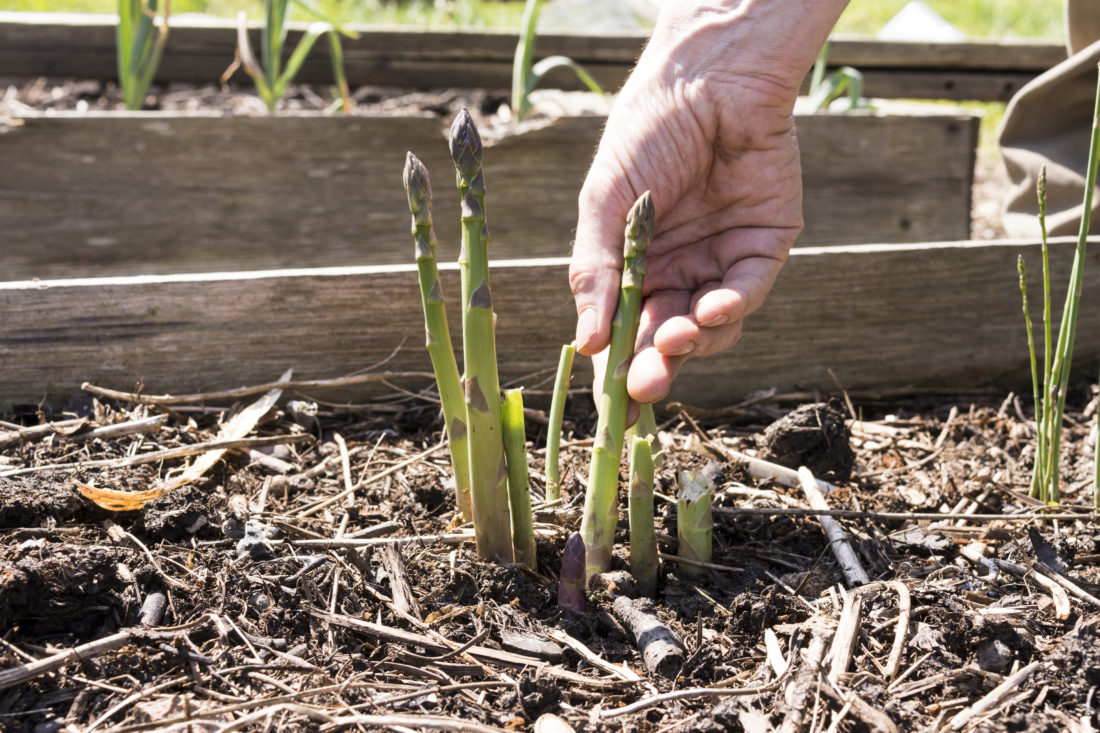Though “edible perennials” may at first glance seem like a strange juxtaposition of gardening terms, growing them makes a great deal of sense for the home gardener in Western North Carolina. An edible perennial is any vegetable, fruit, berry, nut or fungi that produces year after year without replanting — if you’ve eaten asparagus, blueberries, hazelnuts or mushrooms, you’ve eaten perennials.
Joe Hollis of Mountain Gardens in Burnsville promotes the cultivation of edible perennials to foster food system resilience, support soil and water restoration and increase biodiversity. “There are more than 20,000 species of edible plants known in the world today, but fewer than 20 species currently provide 90 percent of our food,” he says. He points to ramps and Chinese mountain yams (also known as air potato vine) as wild edible species of perennials that are common throughout Western North Carolina. And bamboo shoots, rhubarb, asparagus and artichokes are domesticated plants that are easily cultivated in the area.
Edible Perennials, the Plants For A Future organization’s reference book for edible plant enthusiasts, notes that perennials require less labor than annuals: Yearly sowing is unnecessary, and regular watering is not normally needed because maximum growth occurs in the spring when soil moisture is often high. Yields will be increased if the plants are pruned, fertilized and weeded, but these measures aren’t essential, and only a compost mulch is needed once in a while. Also, many perennials will thrive in shady conditions where other plants fail, and pests are absent or much less of a problem than with traditional vegetables.
Hollis also points out that many perennials, including rhubarb, asparagus and a range of leafy greens, will provide food during the “hungry gap” months of March, April and May, when annuals are barely showing their heads above the soil. And some choice perennials include soft fruits or salad leaves, which are expensive to buy and keep poorly in the fridge.
But most importantly, he notes, these enduring plants can help protect our environment because they have the potential for carbon sequestration. “Like all plants, perennials pull carbon dioxide out of the atmosphere and convert it to plant material and/or soil organic matter with the help of micro-organisms,” he explains. “The difference is that [with perennials] the carbon is kept in the soil, whereas with annuals, carbon eventually returns to the atmosphere during harvest and tilling.”
Asheville-based Shades of Green Permaculture designs and installs low-maintenance, edible landscapes for residential, institutional and commercial spaces such as schools, medical facilities and even breweries. Founder and design director Brandy Hall says the company’s goal is to help people “transition from standard chemical-driven monocrops to a more diverse, resilient landscape.”
She encourages clients wishing to reconnect with their food system to engage with their landscape by “observing their site and nestling human activity into the natural pattern language of each place.” As an example of how this can work, Hall describes a recently installed permaculture landscape at Monday Night Brewery in Atlanta. “The idea behind the Monday Night Brewery was to do an organic urban orchard with species that fruit during the cooler months from which they can harvest the ambient yeast on the fruit through louvered vents and make site-specific sour beers,” Hall explains.
Shades of Green also added some herbs, such as rosemary, mint and pineapple sage, but other nonedible elements were planted in order to increase the overall effectiveness of the landscape. “The majority of the understory is actually a mix of native wildflowers and grasses to support the bees needed to pollinate the fruit and also help repair the soil of this post-industrial site,” she says.
Those looking to add edible perennials to their landscape should consider planting this fall, says botanist, herbalist and forager Abby Artemisia of The Wander School in Burnsville. “Spring is busy enough with soil preparation; in our region, now is the perfect time to get those perennials in the ground,” she says. “During the fall, the ground still retains some warmth, so it’s actually a better time than early spring when the ground is still cold. They’ll put on root growth and establish themselves quickly, so they’re ready to grow in leaps and bounds come spring.”



Before you comment
The comments section is here to provide a platform for civil dialogue on the issues we face together as a local community. Xpress is committed to offering this platform for all voices, but when the tone of the discussion gets nasty or strays off topic, we believe many people choose not to participate. Xpress editors are determined to moderate comments to ensure a constructive interchange is maintained. All comments judged not to be in keeping with the spirit of civil discourse will be removed and repeat violators will be banned. See here for our terms of service. Thank you for being part of this effort to promote respectful discussion.